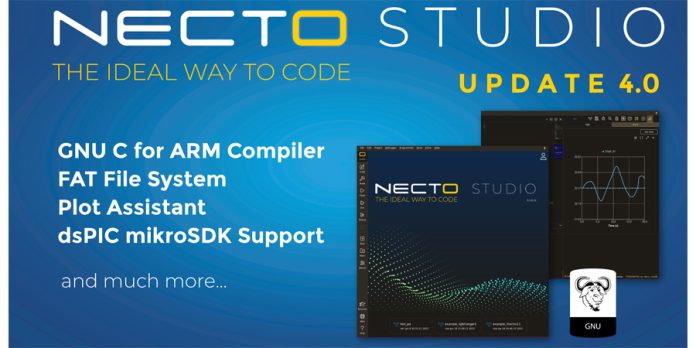Myriad of new features includes Planet Debug board sorting functionality and easy access
MikroElektronika (MIKROE), the embedded solutions company that dramatically cuts development time by providing innovative hardware and software products based on proven standards, has launched a new version of its powerful IDE (Integrated Development Environment), NECTO™ Studio 4.0, which now includes including full releases of mikroC AI for ARM, PIC, PIC32, dsPIC, and AVR. The update also adds GNU C for ARM, and makes using Planet Debug™, which enables designers to develop and debug embedded systems remotely over the internet without investing in hardware, more powerful and simpler to use.
One of the most significant new features of NECTO Studio 4.0 is the natural and seamless integration of the GNU C compiler for ARM. This extends support for a range of cores including M0, M0+, M3, M4, and M7 from various vendors such as STMicroelectronics, Texas Instruments, and NXP. This integration is especially beneficial as it provides compatibility with mikroSDK libraries for ARM, allowing developers to use a myriad of Click libraries on ARM microcontrollers with the GNU C Compiler. Moreover, developers can switch between different architectures without the need to modify their code.
Another new addition is the introduction of NECTO Studio Plot, a real-time data collection tool that requires no additional hardware or bulky libraries. With just a single line of code, developers can log data, which is collected in an Excel-like table view. This data can be exported to a CSV file at any moment, which is highly beneficial for data analysis and reporting, and is set to change how developers collect and visualize data from microcontrollers.
As Planet Debug continues to gain in popularity, MIKROE is continuing to add new features into NECTO, the IDE on which Planet Debug runs. In NECTO Studio 4.0, one notable enhancement is the automated sorting function, which intelligently prioritizes and displays available boards prominently. This sorting mechanism saves developers’ time, enabling them to quickly identify and select the boards they need without scrolling through a potentially long list.
Comments Nebojsa Matic, CEO of MIKROE: “Our mission is to save design engineers time. Every new feature we add into NECTO aims to make the design engineer more productive. Take MIKROE Passport, that is also new. A unique login system that unifies access across all MIKROE platforms, including NECTO Studio, Planet Debug, Libstock, MIKROE forum and MIKROE shop, MIKROE Passport allows developers to use their existing accounts from Google, GitHub, Microsoft, Facebook, or Apple to connect with MIKROE, eliminating the need for maintaining multiple accounts and passwords, making access to MIKROE’s resources more streamlined and hassle-free. Of course, it is also totally secure.”
A new video is available on MIKROE’s YouTube channel which explains all the new features.









